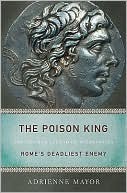More on this book
Kindle Notes & Highlights
Read between
August 31 - September 8, 2020
Genocide is a charged concept, but it seems fair to cast the carnage of 88 BC as genocidal. Genocide, defined by the United Nations in 1948, specifies killing or maiming with intent to destroy, in whole or in part, a national, ethnic, racial, or religious group. Mithradates’ intent to exterminate Romans living in Anatolia was explicitly based on language and ethnic origin. His goal was the elimination of an enemy by destroying the entire Italian-speaking population in Asia Minor.
But the official definition of terrorism is debated. It is often said that one nation’s terrorists may be another nation’s freedom fighters, and that “war is terror within bounds” whereas terrorism exceeds the horrors expected in warfare.
Folklorists have a word to describe the way real-life actions can be guided by legends: ostension. Ostension explains how widely known myths and legends sometimes shape ordinary people’s behavior patterns, leading them to enact or perform certain elements from mythic narratives, thereby translating fiction into fact. Events inspire stories and stories influence events.27 The concept of ostension is another reason why some episodes in Mithradates’ life story appear to mirror Greek myths and theater. If Mithradates was guided by something like a mythic hero script, that helps explain his
...more
Alexander had a habit of tilting his head to the left; some sculpted portraits of the youthful Mithradates not only resemble Alexander but also show his head inclined leftward.
After his father was buried in the royal mausoleum at Amasia (the old Pontic capital), young Mithradates was crowned king of Pontus, in 120 or 119 BC.
(Mithradatids worshipped Zeus as a form of Ahuramazda/ Mithra).
Arsenic—poison of kings and king of poisons—was almost certainly the secret ingredient.
The most prized Indian poison was the mysterious dikairon, said to be excreted by a tiny orange “bird” that nested in the Himalayas. A few grains of dikairon, it was said, would bring a dreamy death in a few hours, ideal for suicide. I have suggested elsewhere that dikairon might have been pederin, exuded by large orange blister beetles of Asia, often found in bird nests.
“King of Kings.” This was a coveted ancient Iranian title (Persian, Shahanshah) that could be held by only one supreme Near Eastern ruler at a time.35
His name is memorialized in the term mithridatism, the practice of systematically ingesting small doses of deadly substances to make oneself immune to them.
(and a book in several languages is still called a “mithridates”).
Only one other individual in antiquity had linguistic abilities that even approached those of Mithradates. According to Plutarch, Queen Cleopatra of Egypt “spoke many languages and gave audiences to most foreign ambassadors without the help of interpreters.” She knew Greek and Latin, and some Ethiopian, Coptic, Hebrew, Median, Arabic, Syrian, and Persian.
“Mithridates spoke or read the languages of 22 nations; he could address and listen to the petitions of all of his subject peoples without interpreters.” Valerius Maximus cited Mithradates’ linguistic proficiency as a shining example of “industrious study.”
Mithradates speak or read with ease? These are certain: Greek, Macedonian, Persian, Latin, Aramaic/Hebrew, Parthian, Armenian, Old and New Phrygian, Cappadocian, and the Gaulish dialect of his Galatian lover Adobogiona. Other languages may have included Avestan (Old Iranian, used in Zoroastrian prayers); Sanskrit (Hindu medical texts); Egyptian and Punic; Celtic/Gallic (perhaps Allobrogesean, the language of his bodyguard Bituitus). He knew some Anatolian tongues, such as Carian, Mysian, Isaurian, Lydian, Lycian (and Pisidian), and maybe had a smattering of Syriac, Elamite, and Sumerian (used
...more
Meteors were associated with the Anatolian mother goddess Cybele, who was represented as a stone that fell to earth.
In the pantheon of Rome’s three most dangerous enemies, Spartacus stood alongside Hannibal and Mithradates.
Lucullus now dreamed of vanquishing the Big Three, the greatest empires in the known world. First Mithradates, then Tigranes, and now—Parthia!
At age forty, Pompey had already celebrated two Triumphs; he claimed credit (many said unfairly) for defeating both Sertorius and Spartacus. Pompey and his older rival Lucullus met at a village in Galatia.
King Mithradates. He was the last independent monarch left standing in the new Roman world.
I neglected to take precautions against that most deadly of all poisons, which lurks in every king’s household, the faithlessness of army, friends, and children.”3


